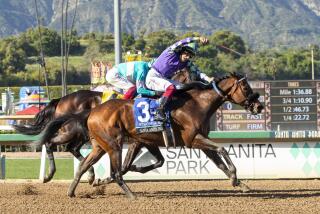HORSES : Appraiser Determines What’s Fare
If you’re in the horse-trading business, a horse is worth “whatever you can get for him.” But what if you’re a greenhorn?
You can consult a professional equine appraiser, who generally charges $150 to $500. Just as do real estate appraisers, who estimate the value of a home before you buy it, equine appraisers have an important role in the horse market. They can help the neophyte horse-buyer determine whether Old Paint is really worth the $1,500 asking price--or more like $500.
Such an appraiser is Jerri Plum of Long Beach, who has 25 years of experience in the horse industry and is the founder and owner of several equine enterprises: Unicorn Stables, a professional boarding stable; Ladies of Royalty, a quarter horse and paint breeding operation, and the Unicorn’s Horn, a saddlery shop.
Combine that expertise with her nursing background and you have the complete horsewoman. Last week she was up all night tending to one of her broodmares, which presented her with a healthy paint filly. What’s that foal worth?
“Too early to tell,” Plum said with a grin.
She spends an hour or more intently observing, touching and interacting with a horse. Evaluating a horse recently, she moved meticulously from the horse’s eyelid (“the conjunctive part should be pink”) all the way to its tail (“it should have some firmness, like a handshake”).
These are among the dozens of tests of the horse’s health and overall physical condition that Plum looks for. A neophyte horseman might assume the horse is healthy because, unknown to him, the owner had recently bathed it and groomed it.
A knowledgeable horse trainer or breeder may be able to make a similar assessment without charge, but he may also have a vested interest in seeing that you buy a certain horse. An equine appraiser, on the other hand, is neutral. Her duty is to advise you objectively on the relative merits and faults of a particular horse you have hired her to evaluate.
That involves more than a physical inspection of the horse. Plum spends hours combing through the horse’s show record, breeding record and similar documentation for its ancestors and siblings. She reviews the paperwork for up to six generations, if it is available. She then investigates the present horse market, arrives at an average selling price for that type of horse and determines what the horse’s siblings would sell for. Whatever makes this horse unique--a more striking appearance or a better temperament--round out the equation. Plum then arrives at a range for the horse’s value, rather than a specific dollar figure.
Some factors are less scientific. Plum recommends that anyone considering the purchase of a certain horse think about the following:
- How much is the horse worth to you ? For example, a couple who want a pleasure horse have $1,000 to spend. They find two prospects: a $700 horse that’s adequate and a $1,100 horse that is perfect for both of them in size, temperament and training. Plum suggests they find an extra $100 and buy the horse that is right for them.
- How does the horse look overall? Is it balanced in body conformation? Plum looks for such things as whether the horse’s legs are straight and whether its head, for example, looks too large or too small for its body. Observe the horse both from a distance and up close.
- How does the horse act when you approach it? If it is “head shy” (lifting its head away sharply so you cannot touch its face or ears), it may have been mistreated. If it won’t calmly lift its hoofs for you, it may not have been well trained.
Plum suggests that you spend some time just being around the horse and observe its behavior. The most important thing, she advised, is to ask: “Is the horse happy being a horse?” If not, she said, you’re not going to be happy owning it.




